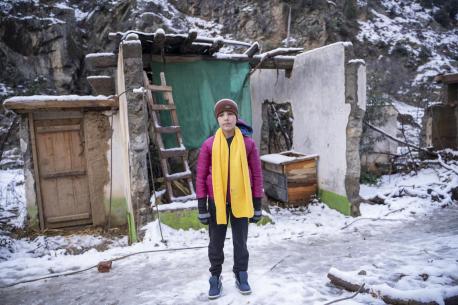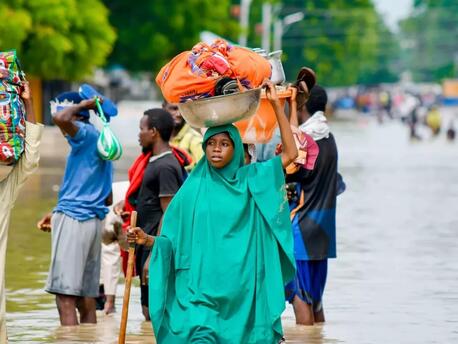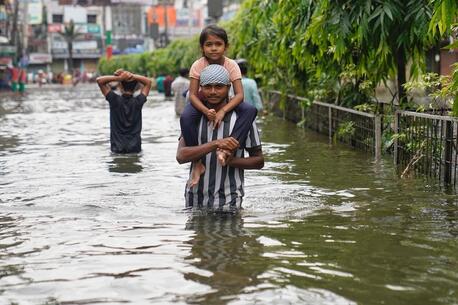
Displaced by the Flood in Pakistan
Children and families uprooted by flooding struggle to survive Pakistan’s harsh winter. UNICEF is providing critical humanitarian assistance.
Khyber Pakhtunkhwa, Pakistan: Ten-year-old Noorullah has fond memories of his early childhood by the banks of the Panjkora River in the tranquil Upper Dir District of Khyber Pakhtunkhwa Province, northwest Pakistan. The river has always served as a lifeline for Noorullah’s family and thousands of others living alongside the meandering river.
“I used to catch plenty of fish in this river with my grandfather during the summers,” says Noorullah." I always felt blessed to be living next to the river.”
He cautiously stands on the snow-covered banks and watches the icy cold river below. “The sound of the flowing water used to feel soothing. Now I fear it.”
Six months back, torrential monsoon rains dumped the equivalent of nearly 10 years of rains, causing the most catastrophic floods in Pakistan’s history. The once calm Panjkora River swelled to mammoth proportions and swallowed Noorullah’s village and all those around it.
The river used to give so much. That day, it took everything.

Homes and villages vanished in the floodwaters, as if they had never existed
The fourth grader vividly recalls the fateful morning. It was a school day. Noorullah and his family were eating breakfast when the phone rang. A frantic voice on the other end, his father’s friend, urged them to evacuate immediately and head for higher ground.
“The river had washed away several houses located upstream. We were next!,” says Noorullah. The family hastily grabbed anything they could from the house and left for a relative’s house in Dir city.
The raging river swept away Noorullah’s house and many of their belongings. Only the remnants of two rooms remained. The rest of the house vanished as if it never existed.
Noorullah and his family — six siblings, parents and grandparents — lived with relatives in the city for the next three months before finally returning to what was left of their house.
“It was hurtful to come back to nothing," Noorullah recalls. "My family would often help others in my village. Now we have nothing left and needed help. A few relatives chipped in and helped us build three makeshift rooms to live in.”

The family of 10 had barely squeezed into their tiny abode when a bitter winter set in. © UNICEF/Pakistan/Asim Khan
UNICEF winter kits containing warm clothes and blankets protect children from freezing temperatures
The family of 10 had barely squeezed into their tiny abode when the frozen winter months arrived. Winters in Upper Dir are notably harsher than other parts of Pakistan, with heavy snowfalls and temperatures dropping as low as 14 degrees Fahrenheit.
Partially reconstructed homes offered little protection for Noorullah, his siblings and other children living in Upper Dir. The threat to children's well-being and survival increased with every drop in the mercury. To make matters worse, most had lost all their warm clothes and blankets in the floods.
Acting urgently, UNICEF dispatched warm clothes, shoes, gloves, hats, blankets and quilts to flood-affected children and families in Khyber Pakhtunkhwa Province. Working in partnership with the government, UNICEF distributed over 48,000 winter kits, directly benefiting over 2,000 families in eight critical flood-affected districts.

It will take months, if not years, to rebuild. UNICEF will be there to help children and families
“Winter in Khyber Pakhtunkhwa is extremely cold. We knew we needed to respond immediately to make sure all children and families affected by the flood are able to survive the winter months,” says Zaheer Ahmed Durrani, UNICEF’s Planning, Monitoring and Evaluation Officer and Emergency Focal Person in Khyber Pakhtunkhwa. “With the help of the provincial government, we have reached the most vulnerable children and families in remote areas. It will take families several more months, if not years, to rebuild what they lost in the floods but with our assistance, they know that they are not alone in their struggle.”
UNICEF is working with partners to provide children and their families affected by Pakistan's floods with the humanitarian aid they urgently need to survive. By the end of February 2023, UNICEF had reached 1.95 million people with safe drinking water, provided primary health services for 1.5 million and treated 95,000 children for severe acute malnutrition.
Moeed Hussain is a UNICEF communication officer in Pakistan. This story originally appeared on unicef.org
HOW TO HELP
There are many ways to make a difference
War, famine, poverty, natural disasters — threats to the world's children keep coming. But UNICEF won't stop working to keep children healthy and safe.
UNICEF works in over 190 countries and territories — more places than any other children's organization. UNICEF has the world's largest humanitarian warehouse and, when disaster strikes, can get supplies almost anywhere within 72 hours. Constantly innovating, always advocating for a better world for children, UNICEF works to ensure that every child can grow up healthy, educated, protected and respected.
Would you like to help give all children the opportunity to reach their full potential? There are many ways to get involved.




